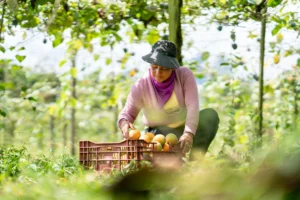FLPC Director Emily Broad Leib was recently interviewed by Clinical Law Prof Blog; read the interview below.
In the spirit of thanksgiving and the abundance of food most of us partook in last week, I thought this would be a great time to continue that theme and learn about the amazing Food Law and Policy Clinic that Emily Broad Leib supervises at Harvard. Here’s a recent interview I had with Emily about the interesting work she is doing. Enjoy!
-
I recently saw that Fortune and Food & Wine Magazines named you as the number one most influential woman in food and drink for 2016. This seems like a pretty big deal!
For the past three years, Food & Wine and Fortune Magazine have put out a list of the most innovative women in food & drink. I was incredibly surprised and humbled to be included at the top of the list! This honor was mostly in recognition of the work of my clinic, the Harvard Law School Food Law and Policy Clinic (FLPC), on the issue of food waste. 62.5 million tons of food is wasted annually in the U.S., presenting a grave threat to our economy, health, and environment. While there are a variety of reasons for this pervasive waste, we’ve come to learn that much of this waste results from laws regulating the food system.
My work in date labels and the broader issue of food waste began from a clinic project we conducted on behalf of Daily Table, an organization that aims to increase access to healthy and affordable food by rescuing and selling surplus foods that would have otherwise gone to waste. To answer Daily Table’s legal questions, clinic students examined the laws in Massachusetts regarding date labels on food. When we zoomed out from Massachusetts to see what surrounding states were doing, we found a dizzying array of state laws, many of which restrict sale or donation of past-date foods. This is despite the fact that these dates are generally intended as indicators of quality, not safety, and for the most part food will still be safe and wholesome after that date has passed. Our work on date labels continues, and we’ve branched out to tackle other policies impacting food waste, such as food safety regulations, tax incentives for food donation, and liability protections for food donation.
-
You are currently (among many other things), the Director of the Harvard Food Law and Policy Clinic. There are few law schools, if any, that have this type of clinic. Could you please take a moment to describe the impetus for this clinic and the types of projects and cases on which students work?
When I was in law school, my main focus was human rights law. I didn’t know anything about food policy until my post-law-school fellowship in the Mississippi Delta, working with community partners improve health and economic opportunity in that region. Early in my time, community partners asked for legal assistance regarding local farmers markets. Food is closely linked to both health and economic opportunity. The Mississippi Delta is an agricultural region, yet there was hardly any production of food, and severe food access challenges. At the same time, many Mississippians were exploring opportunities to produce and sell farm products, but faced legal barriers. Communities around the country were struggling with similar legal and policy questions, and I learned that law students were eager to work on these issues. The Food Law and Policy Clinic aims to meet these needs. The mission of the clinic is to increase access to healthy food, support small-scale and sustainable food producers in breaking into new commercial markets, and reduce the waste of healthy, wholesome food.
In order to better explain the type of work that we do, I’ll continue on the topic of date labels described above. Since our initial project with Daily Table, students have had the opportunity to create a range of reports, resources, and materials, including:
- Preparing a confidential legal memo on date label laws, liability protections, and food safety risks for our client organization, Daily Table.
- Drafting a major national report, The Dating Game: How Confusing Food Date Labels Lead to Food Waste (published in partnership with the Natural Resources Defense Council), which analyzes the laws regarding date labels and explains how these labels contribute to an alarming amount of unnecessary food waste.
- Helping to plan, produce, edit, and distribute a short film about the problem of misleading date labels, entitled EXPIRED? Food Waste in America.
- Providing guidance to federal legislators in drafting of the Food Date Labeling Act, which was introduced in 2016 in the U.S. House and Senate and aims to clarify and standardize date labels nationally.
- Helping me to prepare and provide testimony on date labels and other food waste policy issues to the House Agriculture Committee as part of the first-ever federal hearing on food waste, entitled Food Waste from Field to Table.
When I first started FLPC, we were the only food law and policy clinic in the nation, but this field is growing, and we are working hard to help build the field. The past two years, we hosted the Food Law Student Leadership Summit, which brought together 100 law students from 50 law schools nationally to learn about pressing food law and policy issues and network with one another and with leading faculty and attorneys in this field. And this year, we helped launch the Food Law Student Network (for students) and the Academy of Food Law and Policy (for faculty and institutions). This academic year, we are leading a consortium of nine clinics and programs at seven law schools to examine and propose recommendations for the U.S. Farm Bill. It is exciting to see this field grow, and to work with fantastic colleagues and partners around the country!
-
As a clinician, I think it’s so important for our students to see our passion for the clients and issues we serve. Why do you have a passion for the type of legal advocacy you are taking part in at Harvard through the Food Law and Policy Clinic?
I feel incredibly lucky that my work aligns with my passions. As mentioned above, I went to law school to pursue a career in human rights. What can be more basic than helping communities to pursue the right to food, by providing access to affordable, safe, and healthy food? I also value the opportunity that I have to be creative. Food law and policy is still a nascent field, which provides ample opportunities for finding new solutions and brainstorming creative approaches. Lastly, I love the educational part of my work – exposing law students to the field of food law and offering them opportunities to practice policy and advocacy skills, which have not typically been part of the law school curriculum.
-
You are also the Deputy Director of the Harvard Law School Center for Health Law and Policy Innovation. I can potentially envision synergies between both of the clinics you supervise.
Yes, there are incredible synergies! The FLPC is one of two clinics housed within the Center for Health Law and Policy Innovation; the other is the Health Law and Policy Clinic (HLPC). While there are certainly distinctions between the substance of the two clinics, there is also a lot of overlap and we have worked together on several major initiatives. One is a project called Providing Access to Healthy Solutions (PATHS), which was a four-year project focused on state and federal policy solutions to reduce type 2 diabetes. The other is our Food is Medicine initiative, which identifies key legal and policy levers to help increase access to healthy food as part of both prevention and treatment of chronic disease. The concept of food is medicine is still novel, but is quickly gaining traction. Our team undertakes a variety of research and advocacy to promote the effective integration of food into healthcare coverage where applicable.
-
Speaking of synergies, what are some creative ways the directors/faculty/supervisors of the numerous legal clinics at your school stay connected with each other?
Harvard is lucky to have a very large and robust clinical program, but because of the size it is difficult to stay connected. Fortunately, we have a variety of cross-clinical working groups and committees, including a clinical workshop committee that organizes workshops on topics such as clinical scholarship, use of technology, and better addressing race and diversity in our clinics. We also have periodic social gatherings and holiday parties that bring together clinicians. I also work closely with our other clinics, as food overlaps with many other topics. In addition to our collaboration with the Health Law and Policy Clinic (mentioned above), we have also conducted clinical projects in partnership with the Emmett Environmental Law Clinic, International Human Rights Clinic, and Transactional Law Clinics. I love these cross-clinic partnerships because they offer a great opportunity to bring together different expertise to help solve problems!


Food Law & Policy, Commentary
Policy to Reduce Methane Emissions and Feed More People
April 3, 2025